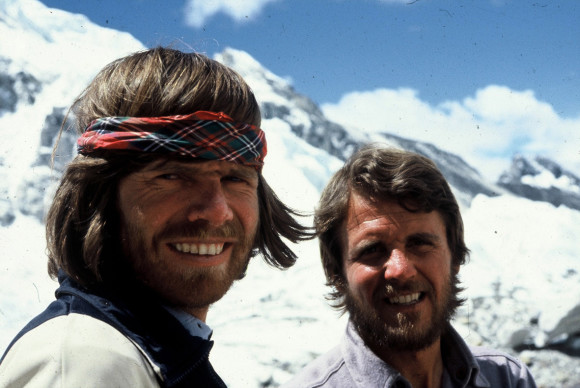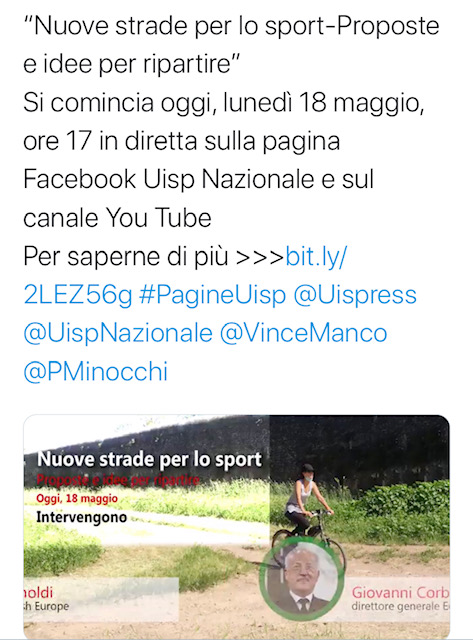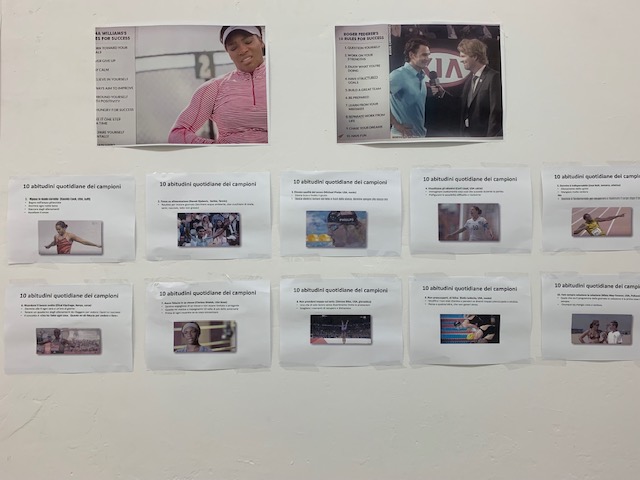Monthly Archive for May, 2020
Page 2 of 2
The reduction of vehicular emission due to the COVID-19 lockdown has cleaned the air over Nepal and northern India. So much so that the Himalaya is visible from Chandigarh, Kangchenjunga is visible from Siliguri. And for the first time in many years, Mt Everest can be seen again from Kathmandu Valley even though it is 200km away.

A year ago, we were talking to tennis girls about the athlete’s lifestyle. An important aspect in the construction of a junior athlete’s career to understand that beyond the training, the lifestyle influences the development and performance of the athlete.
This photo, now hanging on the wall of the Olympic Preparation Centre in Formia, Italy, summarizes examples of the lives of great champions of 10 different sports.
Now our life is deeply changed but these habits continue to be true.
These are trying times in any professional field and even sport has had to stop in the face of the Covid-19 pandemic.These first two months of lockdown at home have been really hard for those who are used to spend their days engaged in intense and prolonged training or to travel and participate in competitions. Who better spent this unique time in everyone’s life? Probably those who have managed to make sense of their days by recreating their habits and activities within the walls of their homes. For example, from Cristiano Ronaldo to the young junior athletes, to follow a program of physical preparation has been an important moment of their daily life, representing a bridge between yesterday, today and tomorrow.
I have already written in other posts about the importance of mental training and watching videos of one’s own performances and those of other athletes. It was a different way of training, not simply doing “something”, to improve physically, mentally and from a technical-tactical point of view. The evaluation that I have taken from the information received by the athletes I work and mainly related to three sports (shooting, tennis and table tennis) is that having followed training programs at home in a regular and daily way has allowed to restart training on field in a very positive way and with a perception of fluidity and effectiveness of their technical and tactical actions.
Now opens the next phase, characterized by the restart of training on field but without the competitions, whose opening times will vary greatly in different disciplines. Starting from this total uncertainty about the opening to competitions, the athletes could train for a very long period, maybe even more than 100 days without participating in official competitions. This situation is also totally new and will have to be set up following a different approach from the usual one. A group of international experts working in contact with athletes preparing for the Olympics has highlighted an increase in problems related to sleep reduction, reduced appetite, increased fixed thoughts of worry, loneliness and fear that the current uncertainty could lead to the loss of the Olympic moment (Schinke et al., 2020).
In these cases, the consultation provided had the goal to listen to the athletes thoughts and feelings, encouraging them to express their fears, frustrations, before coming to prepare to provide solutions. Openness also meant encouraging a clear flow of communication between athletes and those who work with them in their sports organizations. This has served to strengthen relationships and unify the members of each team and to have constructive discussions. This openness has gone beyond working with mental performance consultants and it has also served to support the relationship with friends and family. Openness has meant much more than a sports-focused discussion, and it has extended to issues related to the basic human condition, such as healthy living, eating, sleeping and thinking about one’s life in global terms.
We live in a stormy time and certainly concerns about our human condition need to be listened to and oriented in a constructive way, and this is a role that sports psychologists have to play in relation to athletes, coaches and sports organizations. At the same time, there is another aspect of psychological counselling linked this time to training cycles. Today, which mental aspects should be trained, the same as always and in the same way or it would be more functional to this period to train mentally in a different way, devoting more time to the stabilization of skills to which less attention is usually paid (e.g., among the others breathing in the different moments of the training, pause management, mindset at the beginning of the training, proprioceptive awareness, mind aspects of the warm-up), because most of the mental preparation is oriented to meet the needs of the competition calendar.
In these days of slowing down the lockdown we were living in I wondered what I had learned, what I was taking with me as an experience of these 2 months.
Interpersonal contacts vs. digital communication
Interpersonal closeness to people, not mediated by technology, is a necessity for us mammals accustomed to lead a daily social life based on immediate physical contact. This period I understood that digital communication alone cannot replace this need, which has always been satisfied by human beings.
On the contrary, however, I could also fully become aware that online communication and the ease of its access are factors with an extraordinary impact on work and relational life. Digital acts in the direction of giving us a greater availability of the resource from which we suffer the most: the time. It is a saving that also has an effect on our daily well-being, reducing stress due to a lifestyle in which travels take up too much of our time.For the future, we must enhance the care of interpersonal relationships through physical proximity, but at the same time digital is the most effective way to better manage the complexity of professional life.
Balance and priority setting between well-being and work
In these weeks of lockdown personal wellbeing and professional needs have become more clearly intertwined than the usual organization of our days. The effort of adaptation has been very significant as we found ourselves living an unforeseen and previously unplanned condition. Just think about the difficulty of many families divided between the work organization of the parents and the online school commitments of their children. In an increasingly digital future it will be necessary to find a balance between private life and work, between everyday stress and well-being.
Work in presence and work online
In my work with athletes and professionals from other professional fields it was necessary to adapt to this new solution – at a distance – especially in understanding and making them understand that working together was not “something, waiting to start again in the usual way” but it was the best way to train mentally and to prepare for performance in a way that was certainly different but no less effective. The mental attitude of doing something “waiting to” was widespread and it took some time before accepting a different way of thinking. Currently the people I work with are convinced that this period has allowed them to become aware of aspects of their performances and the importance of developing certain skills that they would never have achieved, as they would have been too involved in the running of the season.
Historical event today, May 8, 1978 Austrian climber Peter Habeler and Italian Reinhold Messner are successful in climbing Everest for the first time without supplementary oxygen. Till that today this result was thought impossible for a human person.


Reinhold Messner and Peter Habeler in 1978. Image via outdoorteam.at
Mount Everest as seen from Base Camp 1. Photo credit: Rupert Taylor-Price/Flickr
Sorry, this entry is only available in Italiano.






